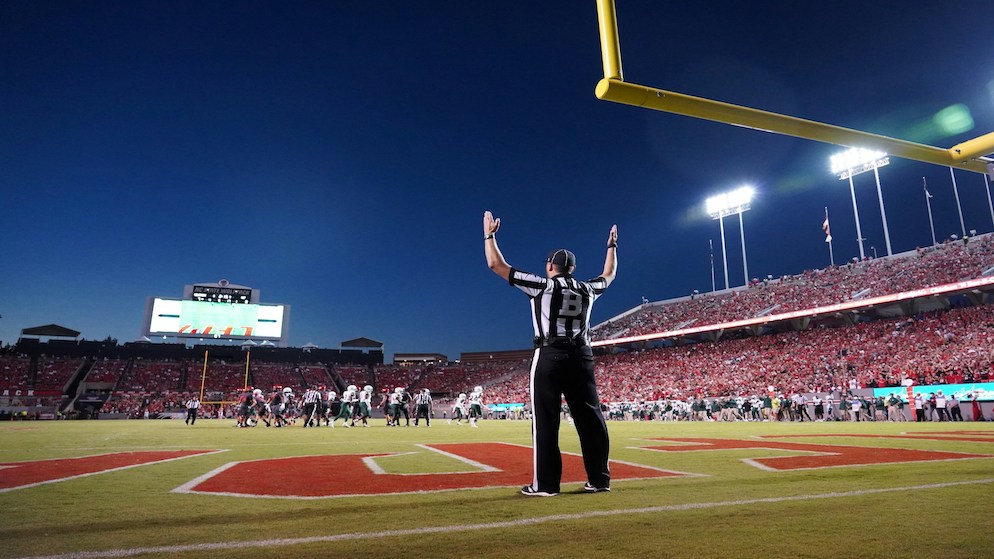
How Much Do NFL Refs Make: The Breakdown
For millions of fans who watch the National Football League every week, the officials in black and white stripes are a constant presence, but their world is often shrouded in mystery. One of the most frequently asked questions by the public is how much do NFL refs make, a topic that speaks to the high-stakes nature of professional football. This guide provides the most detailed answer available to the question of how much do nfl refs make, exploring not just their salaries but the entire ecosystem of officiating at the highest level of American football.
This 4,000-word guide will serve as your definitive resource on the life of an NFL official. We will break down the best estimates for nfl ref salaries, from a rookie official to a seasoned Super Bowl veteran. We will answer the common question, are nfl refs full time employees, and explore the intense, year-round commitment required for the job. We will also calculate the estimated per-game pay to answer how much do nfl refs get paid per game.
Furthermore, this guide will cover the career path to the NFL, the specific roles on a seven-person crew, the pros and cons of the job, and how their compensation compares to officials in other major sports leagues. From the meaning of the white nfl ref hat to the function of the yellow nfl ref flags, this is your complete look into the world of NFL officiating.
The Core Question: How Much Do NFL Refs Make a Year?
The primary question everyone wants answered is how much do nfl refs make a year. While the NFL and the NFL Referees Association (NFLRA) do not make official salary figures public, the details of their Collective Bargaining Agreement (CBA) and reports from major sports media outlets like ESPN and CBS Sports have provided a clear and reliable range.
The Average NFL Ref Salary
Based on the most recent data and reports, the average nfl ref salary is estimated to be around $250,000 per season. This figure is not a flat rate for all officials but an average across all seven officiating positions and levels of experience. This baseline compensation is for the regular season only and does not include the significant bonuses officials can earn for postseason assignments. The question of how much do refs make in the nfl has seen this average figure rise steadily over the years with each new CBA.
Rookie vs. Veteran Pay
The nfl ref salaries are structured on a tiered system based on seniority. A rookie official entering the league for the first time will earn considerably less than a 20-year veteran who has worked multiple Super Bowls. While exact figures are not public, it is understood that an official’s pay increases with each year of service. This means a first-year official might start closer to the $150,000 range, while a highly-tenured referee, the leader of the crew, could earn well over $500,000 per year when including postseason bonuses. This experience-based scale is a key factor in determining how much does a nfl ref make.
The Super Bowl Bonus
The most significant additional income for officials comes from postseason assignments. Being selected to officiate a playoff game is a mark of honor, as only the highest-graded officials from the regular season are chosen. These assignments come with a substantial bonus, reported to be anywhere from $5,000 for a Wild Card game to over $50,000 for officiating the Super Bowl. For the elite officials who consistently earn these assignments, postseason bonuses can add a significant amount to their annual earnings, further influencing the answer to how much do the nfl refs get paid.
Are NFL Refs Full Time Employees?
A common question that arises in discussions about referee pay is are nfl refs full time employees. The answer is nuanced. Officially, NFL officials are part-time, seasonal employees of the league. Unlike referees in the NBA or umpires in the MLB, they are not on a year-round salary and do not receive benefits in the same way as full-time employees. This is why the vast majority of NFL officials have other primary, full-time careers. The league’s roster of officials includes lawyers, business owners, financial advisors, teachers, and firefighters.
However, while their employment status is part-time, the commitment required is anything but. The answer to are nfl refs full time in terms of workload is a resounding yes. During the season, an official spends an estimated 30-40 hours per week on their NFL duties. This includes several hours of film study of the previous week’s game, reviewing training videos sent by the league office, participating in conference calls with their crew, studying the extensive rulebook, and taking weekly rules tests. This is all in addition to the physical training required to keep up with world-class athletes and the travel to and from games across the country.
The Per-Game Pay Myth: How Are NFL Ref Salaries Structured?
Many fans wonder how much do nfl refs get paid per game. This is a common misconception about the structure of nfl refs salary figures. NFL officials are not paid on a per-game basis; they are paid a single salary for the entire regular season.
However, it is possible to calculate an estimated per-game average for context. The NFL regular season currently consists of 17 games for each team. If an official earns the league average of $250,000 for the season, their per-game rate would be approximately $14,700. This calculation helps to answer the query of how much does a nfl ref get paid per game. A more experienced official earning $400,000 would have a per-game average of over $23,500.
This method of understanding how much does a nfl ref get paid per game illustrates the significant compensation for each week’s work. It is this high per-game value that makes the job so sought after, even with the intense scrutiny. The seasonal salary model ensures consistency and professionalism across the league, as officials are compensated for their year-round study and preparation, not just the three hours they are on the field.
The Uniform and Equipment of an NFL Official
The officials’ uniform is one of the most recognizable in all of sports and serves several functional purposes.
The Iconic NFL Ref Jersey
The traditional black-and-white striped nfl ref jersey is a symbol of authority on the field. The stripes, which have varied in width over the years, make officials easily distinguishable from the players. Each official wears a number on their nfl ref shirt for identification, as well as lettering to denote their position (R for Referee, U for Umpire, etc.). In recent years, the league has also allowed officials to wear different colored versions of the nfl ref jersey during certain league initiatives, such as pink accents for Breast Cancer Awareness month.
The Meaning of the NFL Ref Hat
The color of an nfl ref hat is the quickest way to identify the crew chief. The Referee, as the leader of the crew, is the only official who wears a white nfl ref hat. All other six officials on the crew wear black hats. This distinction allows coaches, players, and broadcasters to immediately identify the person in charge who has the final say on all rulings.
The Tools of the Trade: NFL Ref Flags and More
Officials carry several key pieces of equipment. The most famous are the yellow nfl ref flags, which are thrown to signal that a penalty has occurred on the play. These weighted nfl ref flags are designed to be thrown accurately to the spot of the foul. Officials also carry a blue beanbag, which is used to mark spots on the field that are not related to a penalty, such as the spot of a fumble or where a punt was caught. They also carry a down indicator and, of course, a whistle to signal the start and end of plays.

The Pros and Cons of Being an NFL Referee
While the discussion around how much do refs make in the nfl often focuses on the high pay, the job comes with a unique set of pros and cons. The most obvious pro is the excellent compensation for a technically part-time role, which allows individuals to earn a six-figure salary while maintaining another primary career. For those who love the sport, there is the incredible benefit of being on the field, involved in the game at its highest and most intense level. There is also immense prestige associated with the job, particularly for those who earn the honor of officiating in the playoffs and the Super Bowl. However, the cons are significant.
The public scrutiny is arguably more intense than in any other sport. Every call is analyzed in slow-motion by millions of fans and media members, and officials are often subjected to intense criticism and abuse. The pressure to make the right call in a split second is immense, and a single mistake can lead to public outcry and impact an official’s career. The constant travel is grueling, and the year-round commitment to film study and training makes it a demanding job that requires a significant sacrifice of personal time.
The Pros of Being an NFL Referee
- Substantial Financial Compensation: NFL officials earn an excellent salary, with the league average estimated to be around $250,000 per season for what is technically a part-time job. Lucrative bonuses for officiating playoff games and the Super Bowl can significantly increase this annual income.
- Unrivaled Proximity to the Game: Officials have the “best seat in the house” for every game. They are on the field, directly involved in the action at the highest level of the sport, experiencing the speed, skill, and intensity of professional football in a way few others can.
- The Pinnacle of an Officiating Career: Making it to the NFL is the ultimate achievement for a football official. The role carries immense prestige, as only a very small and elite group of individuals are selected from thousands of officials working at the college level.
- Strong Sense of Camaraderie: Officials work in a tight-knit, seven-person crew. The shared experience of traveling together, preparing for games, and making high-pressure decisions under intense scrutiny forges a powerful and unique bond.
- Career Flexibility: Because the role is not a full-time, year-round position, most officials are able to maintain other successful primary careers in fields such as law, business, education, or finance, providing both a second income stream and a professional identity outside of football.
The Cons of Being an NFL Referee
- Intense and Unforgiving Public Scrutiny: This is arguably the biggest drawback. Every decision is analyzed in super slow-motion by millions of fans, coaches, and media members. Officials are subjected to constant criticism, public ridicule, and sometimes even threats for perceived mistakes.
- Extreme Mental Pressure: The stakes of every call are enormous. A single incorrect flag or missed foul can alter the outcome of a game, impact a team’s playoff chances, and influence millions of dollars in the sports betting market. The pressure to be perfect on every play is immense.
- Grueling Travel and Time Commitment: Despite being a “part-time” job, the time commitment is huge. The weekly schedule involves 30-40 hours of film study, rules tests, and physical training, in addition to the cross-country travel every weekend, which takes a significant toll on personal and family life.
- Performance-Based Job Security: Officials are graded on every single play of every game. These weekly performance reviews determine who gets assigned to high-profile primetime games and, more importantly, who is selected for the playoffs. Consistent poor performance can lead to demotion or being let go from the league.
- Risk of Physical Injury: Sharing a field with some of the largest, fastest, and most powerful athletes in the world carries an inherent risk. Officials can get caught in collisions, leading to sprains, broken bones, and concussions.
How Do NFL Ref Salaries Compare to Other Major Leagues?
To fully understand the context of how much do nfl refs get paid, it’s helpful to compare their compensation to that of officials in other major North American sports leagues.
How Much Do NFL Refs Make vs. NBA Refs?
- Salary Range: Approximately $250,000 to over $550,000 per year.
- Employment Status: Full-time employees.
- Regular Season Length: 82 games.
- Comparison: NBA referees generally have a higher annual base salary due to their full-time status and the significantly larger number of games they officiate throughout the season.
How Much Do NFL Refs Make vs. MLB Umpires?
- Salary Range: Approximately $150,000 to over $450,000 per year.
- Employment Status: Full-time employees.
- Regular Season Length: 162 games.
- Comparison: Experienced MLB umpires earn a higher annual salary than the average NFL ref, reflecting the demands of a much longer and more travel-intensive season.
How Much Do NFL Refs Make vs. NHL Refs?
- Salary Range: Approximately $200,000 to over $450,000 per year.
- Employment Status: Full-time employees.
- Regular Season Length: 82 games.
- Comparison: Annual salaries for veteran NHL referees are generally higher than the base salary for NFL refs, again due to the full-time role and longer season.
Frequently Asked Questions (FAQ)
- What was the estimated nfl ref salary 2024? The estimated nfl ref salary 2024 was in line with current figures, with the league average hovering around $250,000 for the season, based on the existing CBA.
- What is the average ref nfl salary? The average nfl ref salary is widely reported to be approximately $250,000 per regular season, though this varies greatly based on experience.
- So, are nfl refs full time or not? Technically, they are part-time employees. However, the weekly and year-round commitment in terms of study, training, and travel is equivalent to a full-time job.
- How many nfl ref flags does an official carry? Officials typically carry at least two yellow penalty nfl ref flags in case of multiple fouls on a single play.
- What determines the final nfl ref salaries? The final nfl ref salaries are primarily determined by an official’s years of experience in the league and their postseason assignments, which come with significant bonuses.

Final Thoughts
The question of how much do nfl refs make reveals a compensation level that is commensurate with a job of immense pressure and importance. While an average salary of around $250,000 for a “part-time” job seems incredibly lucrative, it is a figure that is hard-earned through a lifetime of dedication and a year-round commitment to perfection. The journey to wearing the iconic nfl ref shirt is a long and arduous one, and staying in the league requires constant study, peak physical fitness, and the mental fortitude to withstand intense public scrutiny.
While the exact answer to how much does an nfl ref make will always be an estimate, it is clear that the league compensates its officials as the elite decision-makers they are. The next time you see a white nfl ref hat on your screen, you can be sure you are looking at one of the best officials in the world, whose salary reflects the immense responsibility they hold in the billion-dollar enterprise of the National Football League.





